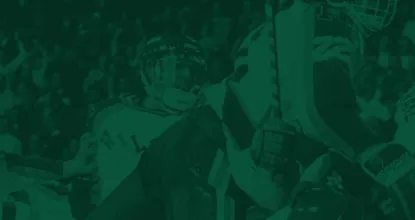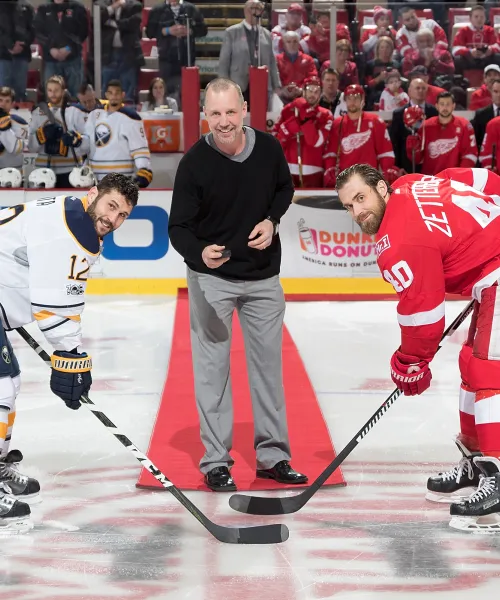
A ’Cat’s recollection from the Championship to the Cup
By Michael Murray '98 BS, '10 MA
Photo by Dave Reginek via Getty Images
There is no debate concerning the greatest moment in the history of Northern Michigan University hockey. Ask 100 Wildcat fans to name the single biggest event in program history, and the near-unanimous response (allowing for a few contrarians who always show up) will be the national championship victory over Boston University on March 30, 1991. A triple-overtime thriller is tough to beat.
But after that game, what other moments make the list? You can make a case for March 29, 1980, when the Wildcats reached the NCAA championship game in the program’s fourth season. You could point to Oct. 29, 1976, when NMU played host to St. Louis University in the team’s first-ever game—or a week later, when the ’Cats recorded their first victory, over Lake Superior State.
But how about an outside-the-box option? Look no further than June 4, 2008. NMU did not play that night. The Wildcat pep band was not in the building. No one was wearing green and gold. Still, it was a great night for NMU hockey.
On the ice in Pittsburgh, the Detroit Red Wings celebrated their 11th Stanley Cup championship. Captain Nicklas Lidstrom took a victory lap around the rink, Cup lifted high. And when he skated back to the Wings’ jubilant scrum for the first handoff, a gesture of respect and honor, he passed the Cup to a pro’s pro, a tough role player at the end of his career, the most accomplished professional athlete ever to come out of Northern, forward Dallas Drake.
Like all members of the ’91 championship team, Drake holds a special place in the memories of NMU fans. Recalling his prolific scoring numbers, however, they might have trouble believing that when he arrived in the fall of 1988 from Rossland, British Columbia, he was just hoping to eventually make a contribution.
“We had a really good team,” he says, “and I went in as a freshman thinking, ‘What do I have to do to play in the lineup, to play regular shifts, to contribute?’ By January of my freshman year, I saw that I could contribute on offense. We had great coaches who gave us opportunities to make the most of our talents.”
Drake said he and his teammates knew the 1990-91 season—his third at Northern—could be special. The team was deep and balanced, but the thing he appreciates most was the camaraderie. “We were a group that loved spending time with each other,” he said. “We had no cliques on that team. We did everything together.”
After a win on Saturday night, we would always be somewhere together. It was a real tight-knit group, and that starts with leadership. Dean Antos, Darryl Plandowski, Brad Werenka—those guys were leaders who set the tone.”
After a senior season in which he earned first-team All-America honors and posted 39 goals and 44 assists, Drake fulfilled a dream by turning pro with the Red Wings, who had drafted him in 1989. He made the team out of training camp, but he knew his college production (220 points in 165 games) would not be possible in Detroit.

Dallas dropping the first puck for the Red Wings in 2017.
“In the NHL, I had to come to the realization that I wasn’t going to be able to do the things offensively that I did in college,” he says. “I knew I had to be more of a role-type player in order to play. So I focused on playing good defense, getting good on the penalty kill. I just accepted that my role was going to be different. It was one of the best decisions I made.”
During his second season, Drake was traded to the Winnipeg Jets, who moved a few years later and became the Phoenix Coyotes. He signed with the St. Louis Blues in 2000 and was team captain during his final two years there, 2005-07.
Heading into the 2007-08 season, which would be his 16th in the NHL, Drake signed a one-year contract with Detroit in the hopes of winning the Stanley Cup. Not only did the Wings capture the title, but along the way Drake passed the 1,000-game milestone, a total achieved by less than four percent of all NHL players.
And when Lidstrom handed him the Stanley Cup in the championship celebration, Drake was a little surprised. “I had no idea that was happening,” he says.
“I was just standing in the pile, so excited that we’d won, excited to watch Nick carrying it around. Then they all started to push me out there. I think most of them realized I wasn’t going to play anymore. It was quite an honor to get that from Nick.”
Just over a month later, he announced his retirement from the NHL. He said he was looking forward to spending more time with his family—and that’s exactly what he did. He has coached all four of his children in hockey and got involved with the minor hockey association in Traverse City, Michigan. The Drake family now splits time between Traverse City and Arizona.
Among NMU alumni who have played in the league, Drake ranks first in games (1,009), goals (177), assists (300), points (477), and penalty minutes (855).
Throughout his career, Drake never forgot about his fans in B.C. or Marquette or anywhere in between. “I’ve talked to lots of people over the years who followed my career and rooted me on,” he says. “And I lived in Marquette in the offseason for six or seven years early in my career, so I took that to heart. I never lost that feeling that this is where I came from. This is one of the reasons I’m in the NHL—getting the opportunity to play in Marquette, at a great school with great coaches. I never forgot about that.”